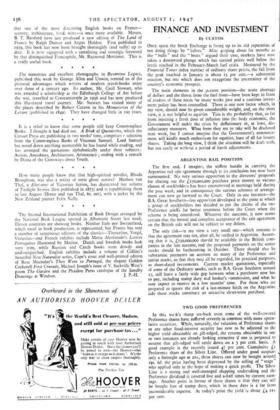FINANCE AND INVESTMENT
By CUSTOS
ONCE again the Stock Exchange is living up to its old reputation of not doing things by " halves." After groping about for months as the " bulls " and the " bears " argued their case, markets have now taken a downward plunge which has carried prices well below the levels reached in the February-March fuel crisis. Measured by the Financial Times index number of ordinary share prices, the fall from the peak touched in January is about 15 per cent.—a substantial reaction, but one which does not exaggerate the uncertainty of the country's economic prospect.
The main elements in the piesent position—the acute shortage of dollars and the threat from the fuel front—have been kept in front of readers of these noses For many weeks past and a cautious invest- ment policy has been counselled. There is one new factor which, in my view, should now be given considerable weight, and, on the short view, it is not helpful to equities. This is the probability that, so far from injecting a fresh dose of inflation into the body economic, the Government will tackle the crisis by deflationary or, at least, dis- inflationary measures. What form they are to take will be disclosed next week, but I cannot imagine that the Government's announce- ment will kindle much enthusiasm for equities, least of all for luxury shares. Taking the long view, I think the situation will be dealt with, but not easily or without a period of harsh adjustments.
ARGENTINE RAIL POSITION
The first and, I imagine, the stiffest hurdle in carrying the Argentine rail sale agreement through to its conclusion has now been surmounted. No very serious opposition to the directors' proposals for sharing out the Ei5o,000,000 purchase price money to various classes of stockholders has been encountered at meetings held during the past week, and in consequence the various schemes of arrange- ment can now go forward to the Court. Only in one instance—the B.A. Great Southern—has opposition developed to the point at which a group of stockholders has decided to put the claims of the two Preference stock's' for better treatment before the Court when the scheme is being considered. Whatever the outcome, it now seems certain that the formal and complete acceptance of the sale agreement on the British side will not be subject to any delays. • The only risk—in my view a very small one—which remains is that the agreement may not, after all, be ratified in Argentina. Assum- ing that it is, Lt5o,000,000 should be available to the British com- panies in the late autumn, and the proposed payments on the senior stocks should be forthcoming in October. There should also be substantiai payments on account on many of the Preference and junior stocks, so that they may all be regarded, for practical purposes, as short-dated investments. Current market quotations, especially of some of the Ordinary stocks, such as B.A. Great Southern around 17, still leave a fairly wide gap between what a purchaser now has to pay, including stamp duty and broker's commission, and what he may expect to receive in a few months' time. For those who are prepared to ignore the risk of a last-minute hitch on the Argentine side these stocks constitute an attractive short-term purchase.
TWO GOOD PREFERENCES
In this week's sharp set-back even some of the well-covered Preference shares have suffered severely in common with more specu- lative securities. While, naturally, the valuation of Preference shares or any other fixed-interest security has now to be adjusted • to the higher yield obtainable on gilt-edged, the returns obtainable in one or two instances are already looking attractive if one is prepared to assume that gilt-edged will settle down on a 3 per cent. basis. A good example is the recently issued 44 per cent. Cumulative LI Preference share of the Silver Line. Offered under good auspices only a fortnight ago at 21s., these shares can now be bought around 19s. 6d. the price having been depressed by the selling of " stags " who applied only in the hope of making a quick profit. The Silver Line is a strong and well-managed shipping undertaking and the Preference dividend is covered five and a-half times by current earn- ings. Another point in favour of these shares is that they can still be bought free of stamp duty, which in these days is a far from inconsiderable expense. At today's price the yield is about £4 xis. per cent.


































 Previous page
Previous page